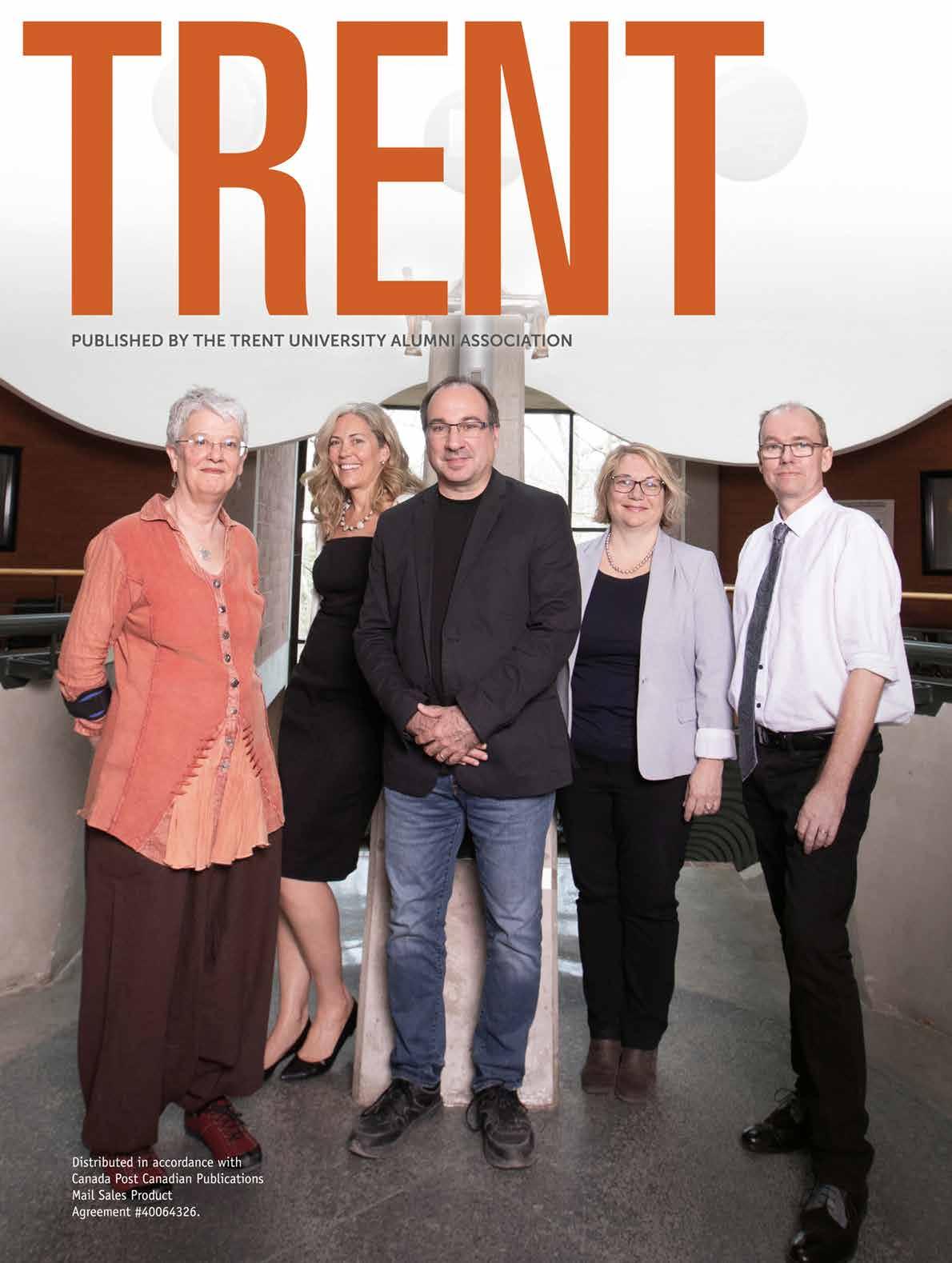
SPRING 2018 49.2
The Deans of Trent University join a slate of experts
The role of universities in 2018

Serious Illness. Critical Coverage. If serious illness interrupts your life, don’t let worries about money get in your way of getting better. Critical Illness Insurance provides a tax-free lump-sum payment to spend any way you need. For a personalized quotation or to apply online, please visit us at: solutionsinsurance.com/trent 1.800.266.5667 Underwritten by Industrial Alliance Insurance & Financial Services Inc. iA Financial Group is a business name and trademark of Industrial Alliance Insurance and Financial Services Inc. Critical Illness Insurance
TRENT is published three times a year in June, November and February by the Trent University Alumni Association. Unsigned comments reflect the opinion of the editor only
Trent University Alumni Association

Alumni House, Champlain College
Trent University

Peterborough, Ontario, K9L 0G2 705.748.1573 or 1.800.267.5774, Fax: 705.748.1785
Email: alumni@trentu.ca
trentu.ca/alumni
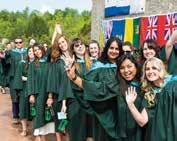
EDITOR MANAGING EDITOR
Donald Fraser ’91
COPY EDITOR
Megan Ward
DESIGN
Beeline Design & Communications
CONTRIBUTORS
Ayesha Barmania ’11, Mark Betteridge ’70, Julie Davis Donald Fraser ’91, Jess Grover ’02, Lee Hays ’91
Melissa Moroney, Kathryn Norlock, Ellanne Thomson ’16 Kathryn Verhulst-Rogers, Megan Ward, Kate Weersink
EDITORIAL BOARD
Marilyn Burns ’00, Sebastian Cosgrove ’06, Donald Fraser ’91, Lee Hays ’91, Melissa Moroney, Ian Proudfoot 73
PRINTING and BINDING Maracle Press, Oshawa
TUAA COUNCIL HONORARY PRESIDENT T.H.B. Symons
PRESIDENT Jess Grover ’02
VP CAMPUS COMMUNITIES
Karen McQuade Smith ’06
VP COUNCIL ORGANIZATION
Steve Robertson ‘93
VP COMMUNICATIONS & MEMBERSHIP Sebastian Cosgrove ’06
VP ENGAGEMENT AND PHILANTHROPY
Maile Loweth Reeves ’79
COUNCILLORS
Wei Lynn Eng ’99, Athena Flak ’99, Tawny Flude ’07, Karen Foster ‘05, James Forrester ’14, Rae Gibeault ’93, Dorcas Mensah ’13, Danen Oberon ’07, Herb O’Heron ’75 Steven Robertson ’93, Jessica Rogers ’12
CHAPTER PRESIDENTS
Maile Loweth Reeves ’79 (York Region) Caleb Smith ’93 (Niagara Region)
Laura Suchan ’84 (Oshawa/Durham Region)
Lorraine Bennett ’72 (Vancouver)
David Wallbridge ’96 (Halifax/Dartmouth)
Steve Cavan ’77 (Saskatoon)
Gordon Copp ’76 (British Isles) Patrick Lam ’86 (Hong Kong)
Jessica Rogers
SENATE
Danen Oberon
Harris
Hays ’91
Follow us @trentalumni on Twitter, @trent_alumni on Instagram, The Trent University Alumni Association page on Facebook, and The Official Trent University Alumni Association group on LinkedIN.
On the Cover: Deans Kirsten Woodend, Moira Howes, Craig Brunetti, Cathy Bruce, David Ellis.
Photo: Michael Hurcomb
T RENT Magazine 49.2 3
COUNCIL-COLLEGES LIAISON
12
ALUMNI REPRESENTATIVE
07 GSA REPRESENTATIVE Danielle
06 DIRECTOR OF ALUMNI AFFAIRS Lee
ALUMNI SERVICES COORDINATOR Sue Robinson ALUMNI & DEVELOPMENT COORDINATOR Julie Ellis MANAGER OF ALUMNI AFFAIRS & CONVOCATION Joanne Sokolowski 4 | Editorial 5 | TUAA President’s Message 6 | What’s New at Trent 8 | Spotlight on Research 11 | Universities Tomorrow, Today... 18 | The Deans’ List 21 | Alumni Benefits & Services 22 | Universities: Class Notes 24 | Unleash the Potenial Campaign Final Report 28 | Building Communities and Driving Discovery 30 | Freedom of Speech at Universities 33 | Giving Back: Gordon Knapp ’79 34 | Alumni Day of Service 36 | Convocation Award Winners 38 | Homecoming and HoTT 42 | Looking Back 11 34 36
POOLS SWUM AND TICKETS PUNCHED: FINDING THE PURPOSE OF THE UNIVERSITY
Ibelieve
I’m one of those rare few who ended up being almost precisely what he wanted to be when he was a kid.
Indeed, if you had asked me in Grade 8, I would have said I’d grow up to be a writer. Not a novelist (although I have a drawer-full of unfinished books). Not of short stories (please see the drawer in the previous sentence).
But someone who could somehow use words as a means of informing people and making change. If pressed, I would have said “journalist,” but, even then, I knew that wasn’t really the right word.
In high school, I called myself a writer—looking back, I did so with a cringe-worthy air of pretention—and vowed to go to university to hone my craft. With Robertson Davies as my hero, I set off to attend Trent University to become “a man of letters.”
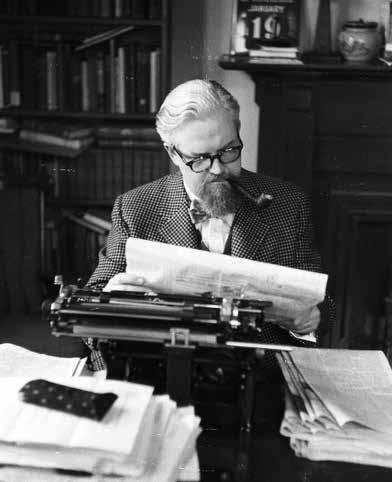
At the time, I figured the purpose of the university was to supply me with a vast pool of knowledge and experience to draw upon as a scribe, and to punch my ticket for landing a career-starting job that would open the door to a lifetime of success. I also imagined following Davies into a gig with the Peterborough Examiner

As I ping-ponged through academic streams, I was given creative inspiration by writers that ranged from the Romantic to the comedic; I gained a sense of political awareness in Native Studies (now Indigenous Studies) and Women’s Studies; I learned more about my place in the world through Canadian Studies. In the process, I managed to put into focus exactly what kind of writer I wanted to be. I just didn’t know how to get there.
Which is where the ticketpunching came in. A couple years after graduating, I was picked up while hitch-hiking from campus to downtown— people still did that in the ’90s. Behind the wheel was Professor Ray Dart. After brief introductions, we chatted about writing and about the environment, and then he pointed me towards a non-profit organization that needed help writing communications materials.
hosting a CHEX Newswatch segment in 2001.
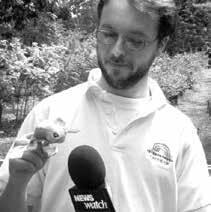
The
It became my first paid gig. And has led to a lifetime specializing in writing for advocacy groups and non-profit organizations. Yes, Professor Davies, it also led to a gig writing for The Examiner for a number of years. Those notions I had of what a university should be? I still hold them today. They remain institutions that should lead you to eventual employment, but also ones that provide a vast array of valued knowledge and experience to help you navigate your career. They should help you find what it is you want to do and who you want to be. And they should give you the tools to fulfil your dreams.
No matter when you first had them.
Donald Fraser ’91 donaldgfraser@trentu.ca
4 TRENT Magazine 49.2
Don’t forget to follow us @TrentAlumni @Trent_Alumni Trent University Alumni Association page The Official Trent University Alumni Association
EDITOR’S NOTES
Photo: Walter Curtin/Library and Archives Canada.
editor
Photo courtesy of CHEX Television
WHAT IS THE ROLE OF AN ALUMNI ASSOCIATION IN 2018?
Ispend
a lot of time pondering that question, and I’m not alone. There are books, podcasts, videocasts, and blogs that observe, theorize, and strategize on these changes. Every year the group of Ontario alumni association presidents have meetings to discuss this very idea. Where do we find ourselves in a changing world, with a changing alumni demographic? Are alumni associations even relevant anymore?
By nature, I’m a creator. I take one material—yarn, string, wire, cloth—and turn it into other things— blankets, sweaters, wall-hangings, jewelry. I’ve often used that metaphor for volunteer work as well, holding that my ultimate goal is weaving together a tighter community where fewer people can fall through the cracks. And, at first, that was how I understood the Alumni Association’s Council and my role within it. I took on the responsibilities of a weaver, knowing that what I created today would need to serve the alumni family in the years to come.
In the decade since I made that commitment to Council, I have watched a transformation happen within alumni relations. The way in which schools connect with alumni has changed industry-wide and Trent is part of that evolution. Dropin alumni pub nights have been enhanced with guest speakers, TRENT Magazine deals more in ideas and less in baby announcements, and we track engagement partially through social media clicks and views. Who we’re connecting with and how we are doing so is in constant flux.
In just the last few years, the TUAA has undergone significant changes. We’ve introduced Shared Interest Groups (SIGs) that bring together alumni in new ways, such as the Community for Trent Women. Last year we saw the birth of ACE: Association Connecting Excalibur,
From left: PSB Wilson, Jess Grover ’02, Caleb Smith ’93, and Alumni Affairs director, Lee Hays ’91, celebrate Mr. Smith receiving the Spirit of Trent Award.
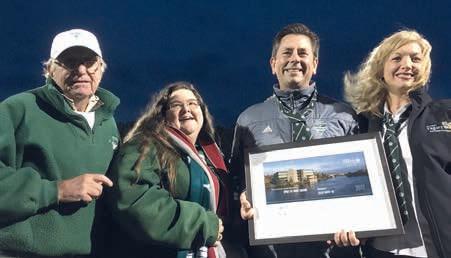
the student alumni association that works to connect students to the TUAA before they graduate from Trent. The Alumni Association Awards are now presented at multiple events and community gatherings that are meaningful to individual recipients rather than as a stand-alone celebration. As these changes have happened, they have strengthened our alumni networks and made the TUAA better. But these changes have also challenged my self-declared role as a weaver of community. So like any good Trent student, I took that challenge as a chance to re-evaluate everything I thought I knew about this work. And, as part of that journey, I retired my weaving metaphor for the Alumni Association. It simply doesn’t work now.
Instead, we are quilters. Every single one of us—alumni, staff, faculty, retirees, donors, friends—is creating an elaborate patch in the TUAA quilt. Our role as an Association, and my task within that, is to ensure that each alum has the tools and materials needed to create something personally meaningful.
Finding ways to help alumni create the communities and opportunities that they want to be a part of is far more rewarding than trying to create them myself ever was. When dozens of people signed up to volunteer as part of our first Trent University Alumni Day of Service in their own communities—outside of our committee-organized sites—I was overjoyed. Seeing the alumni family creating something beautiful with the tools we set out affirmed that this new outlook better suits what we need to be today.
The active creation and involvement of alumni makes the TUAA what it is. The role of an alumni association today is as a conduit for our creativity and passion. We are a community of dreamers, achievers, and trailblazers. Together, we are creating TUAA every day. Thanks for building this kaleidoscope quilt with us.
Jess Grover ’02 jessalynngrover@gmail.com
T RENT Magazine 49.2 5
A MESSAGE FROM THE ASSOCIATION PRESIDENT
TRENT
Wenjack
Trent to Celebrate
“The people in Peterborough and at Trent have always had a spot in my heart. Trent took the initiative to honour Chanie back in 1973. I would like to thank Trent for continuing to honour Chanie, and for their leadership in Indigenous education.”
These words were spoken by Pearl Achneepineskum, Chanie Wenjack’s sister, at the celebration of the Chanie
Wenjack School for Indigenous Studies, where she joined her sisters to celebrate the School naming and help unveil an installation that will honour her late brother.
The School announcement was a milestone development in the University’s longstanding leadership in Indigenous education and reconciliation. It was celebrated
with both Chanie Wenjack and Gord Downie’s families as well as Trent students, staff, faculty and local community members.
Above: Families of both Gord Downie and Chanie Wenjack attended the naming of the Chanie Wenjack school. From left: Patrick Downie, Pearl Achneepineskum, Daisy Munroe, Mike Downie.
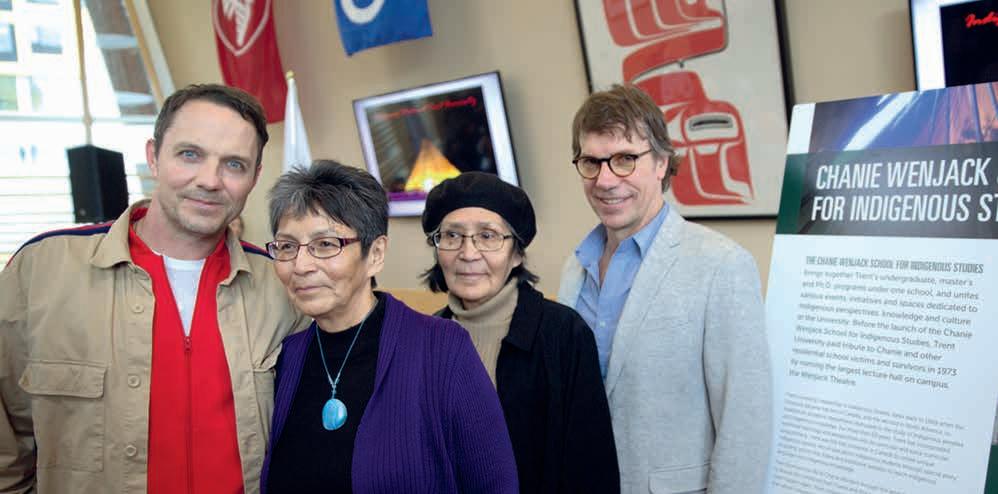
Five more years of Dr. Leo Groarke’s leadership: news that the Trent community was happy to hear this spring. Dr. Groarke’s reappointment as president and vicechancellor by the Trent Board of Governors will begin July 1, 2019 and run through to June 30, 2024.
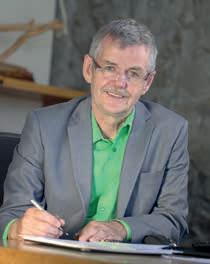
“I am delighted to be renewed for another term at Trent, where I work with an exceptional team of administrators, faculty and staff. I consider myself lucky to have joined the University at the beginning of its 50th anniversary celebrations, and to have the opportunity to help prepare it for another 50 exceptional years under the guidance of the Board, and in partnership with students, alumni, and our local communities. Together, we are building an institution with a storied history that promises to be even stronger in the future,” said President Groarke.
Under President Groarke’s leadership, Trent has marked many highlights and milestones including: record-breaking strides in enrolment success; the expansion of facilities on the Symons Campus in Peterborough; and a new master plan that will accommodate growth at Trent’s Durham campus in the Greater Toronto Area. Dr. Groarke’s next term will see him emphasize sustainability, stewardship and innovation as key themes.
6 TRENT Magazine 49.2
Five More Years for President Groarke AT
UNIVERSITY
& Downie Families Join
Milestone School Announcement WHAT’S NEW
Teaching Excellence Takes Centre Stage at Trent
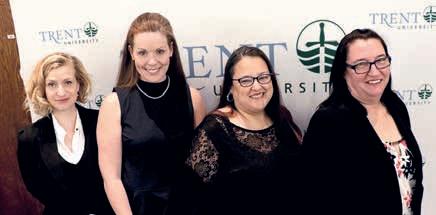
The annual Celebration of Teaching Excellence saw faculty, staff and students gather to honour the following 2018 teaching award recipients: Kelly Egan, Cultural Studies, Symons Award for Excellence in Teaching; Robyne Hanley-Dafoe, Centre for Teaching and Learning/ Education/Psychology, Award for Educational Leadership and Innovation; Malinda Gray, Indigenous Studies, Award for Excellence in Teaching Assistance; Troy Bordun,
Sociology, CUPE 3908-1 Award for Excellence in Teaching; and Paula Sherman, Indigenous Studies, Award for Excellence in Online Teaching.
Trent Durham GTA Child and Youth Studies professor Dr. Alba Agostino was also recognized in a separate ceremony. She was honoured with a 2018 Ontario Undergraduate Student Alliance Teaching Excellence Award for her engaging classroom discussions.
Trent Athletics in the Spotlight
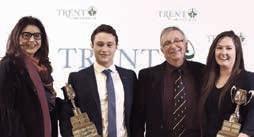
Whether racing down the Otonabee, pushing for a win on the field at Justin Chiu Stadium or battling it out on the court in the Athletics Centre, Trent’s varsity athletes work hard for their achievements. Trent University’s department of Athletics and Recreation celebrated this student achievement at the 49th annual Athletics Awards Ceremony.
The most prestigious award of the evening—the Arthur Cup—went to varsity rowing athletes Abigail Adair and Dayton Kelly. The Arthur Cup recognizes graduating students who have demonstrated outstanding contributions, sportsmanship, participation and leadership in athletic programs. By the end of the evening more than 40 outstanding student athletes were recognized for their achievements in sport at Trent over the past year.
A producer who saw the film Indian Horse told Edna Manitowabi that she was “the heart and soul of the movie.” The professor emerita in Trent University’s Chanie Wenjack School for Indigenous Studies recently co-starred in the film based on the award-winning book by Richard Wagamese, which is receiving critical acclaim from many after its world premiere at the 2017 Toronto International Film Festival.
The film tells the story of Saul Indian Horse, a northern Ojibway child

separated from his family at a young age and placed in a residential school, finding his escape through the sport of hockey while there. Ms. Manitowabi plays the role of Naomi, Saul’s grandmother, who plays an influential role in teaching the main character his language (Anishinaabemowin), the stories of his culture, and survival skills.
As a survivor of residential schools, Ms. Manitowabi was passionate about being part of a film that used the power
of story to teach others of the impact of residential schools on Indigenous people in Canada.
T RENT Magazine 49.2 7
From left: Prof. Kelly Egan, Robyne Hanley-Dafoe, Malinda Gray, Prof. Paula Sherman.
From left: Deborah Bright-Brundle, Dayton Kelly, PSB Wilson, and Abigail Adair.
At a Theatre Near You: Trent Prof Makes Film Debut in Critically-Acclaimed Movie
SPOTLIGHT ON RESEARCH

As home to many leading researchers, Trent University has countless stories to tell when it comes to research success. Through our outstanding faculty, exceptional facilities, and prestigious schools of study, Trent is a place where ideas and creativity connect and intersect with industry, non-profits, communities and real-world solutions. Read more about some of the top faculty, student, and alumni researchers who are making headlines.
FACULTY RESEARCH
Durham
Takes a Deep Dive into Stress
After years working in academia, Dr. Brenda Smith-Chant discovered a common theme among her students and their experiences: procrastination. Her curiosity was piqued. Procrastination is an issue that impacts the majority of university students (over 80%). Working with a team of researchers, including current Trent students, Professor Smith-Chant set her sights on learning more.
FACULTY
GTA. “In order to be productive, people need ‘just the right amount’ of stress to motivate them to move forward, but not so much that they shut down.”
“Our work was based on a very famous observation: people with very little stress are unproductive, as are people with too much stress,” said Prof. Smith-Chant, a Psychology professor at Trent University Durham

STUDENT
Ever considered what happens to rainwater that ends up in the sewer systems of our communities? It’s a topic that a group of students in the Communications and Critical Thinking program know inside out after a semester of research, and hard work.

As part of the inaugural Communications capstone course, led by Dr. Joel Baetz, students were tasked with a project from the Region of Durham to determine, as a research team, the best storm water management fee and credit program for the municipalities in the Durham region, as well as an accompanying communications strategy. An exercise in research, knowledge translation, and communication, the final plan was presented to the “clients” at the Region of Durham at the end of the semester.
“I think that this type of cooperative environment, and shifting deadlines and projects, really reflected a lot of what happens in professional environments, and being able to experience that was extremely useful,” said Trent Durham GTA student Billie Clark about the experience.
The team of researchers set out to test the idea that students are using procrastination as a tool to get their stress level to the place where they will be most efficient and produce good results. Her discovery so far? Procrastination, especially when deadlines are looming, can be a good tool for people to get their stress level to a place where they can do their best work.
“I am no longer worried about being inexperienced or having difficulties applying my skills outside a classroom; I know that I can be successful, even if I am doing something I have never tried before, and I learned that because of this capstone course.”
8 TRENT Magazine 49.2
Shutterstock © Dean Drobot
RESEARCH SPOTLIGHT Warmer, Wetter & Wilder: Students
Weigh in on the
Future
of
Weather
in
Durham Region STUDENT
SPOTLIGHT Examining Procrastination: Trent
GTA Researcher
Students in the capstone course of the Communications and Critical Thinking program present their work to the Region of Durham.
ALUMNI RESEARCH SPOTLIGHT

Passion for Goat Genetics Fuels Entrepreneurial Spirit
ALUMNI
Trent alumna Mubrouka Elharram ’03 is turning her passion for genetics into a unique business—one that’s set to evolve into a major new export economy for Canada: goat genetics, a topic introduced to Ms. Elharram by Trent’s Dr. Bradley White. She has turned what she learned at Trent as both an undergraduate and master’s student into a budding business called GoatGEN. GoatGEN provides genomic-based predictions of novel multi-gene traits for breeding programs that advance the genetic potential of goats.

“Goats provide more animal protein to the world food supply than beef or dairy cattle; Canada has high quality goat genetics desired by developing countries and there is an increasing demand for Canadian goats,” says Ms. Elharram. “At this time in Ontario there is limited goat semen and no goat embryo production facilities dedicated to production, processing or distribution of goat genetics to the international marketplace. The long-term goal is to build our own production facility to evaluate Canadian and target market dairy goats, and build an integrated and commercially sustainable supply and value chain for live animals, semen and embryos.”
RESEARCH EXCELLENCE HONOURS
Accolades abound for books and papers by Trent faculty and alumni. Read on for a few recent highlights:
• Unbuttoned: A History of Mackenzie King’s Secret Life penned by History professor Dr. Christopher Dummitt, is a finalist for the 2018 Canada Prize and the Shaughnessy Cohen Prize for Political Writing.
• Craig Davidson’s ’94 Precious Cargo, which tells his experience driving a school bus with special-needs kids, earned him a coveted spot as a finalist in CBC’s popular Canada Reads competition.
• For her research paper examining employee engagement, School of Business professor Dr. Amina Malik won the Best Paper Award, HR Division of Administrative Sciences Association of Canada.
• Award-winning author, First World War historian, and Trent alumnus Dr. Tim Cook’s ’90 newest book, Vimy: The Battle and the Legend, took home the 2018 John Wesley Dafoe Book Prize.
• A Block in Time, edited by Dirk Verhulst ’76 and Rita Granda, which examines the archaeology and history of one city block in Peterborough, won the 2017 Ontario Archaeological Society Award for Excellence in Publishing.
Follow @TrentUniversity #TrentUResearch on Twitter to read more research highlights and stories, and share your own #TrentU research stories.
Did you receive our Trent Breakthroughs newsletter in your inbox? If not, subscribe at communications@trentu.ca to learn more about the many research highlights coming out of Trent University.

T RENT Magazine 48.3 9
Mubrouka Elharram in her lab


10 TRENT Magazine 49.2 DID YOU KNOW? Donations to Trent through the Annual Fund help to support the Trent Excalibur. To help provide support to our student-athletes with scholarships and mental health services, please make a gift to athletics by visiting trentu.ca/give & more Do you ever wish you were still a student? Health coverage, no classes on Tuesdays, and an endless metabolism... Well, some things don’t have to change! Grad Perks offers supplemental Health & Dental Plans that get you the coverage you need and then some! Visit studentvip.ca/gradperks to find out how you can access your coverage along with prescription delivery service, virtual doctor and much more! We’ve got you covered. EXCALIBUR FOREVER #WE BLEED GREEN
UNIVERSITIES TOMORROW, today
Foryears, TRENT Magazine has covered issues that affect universities and the communities associated with them. Never before, however, have we delved into the nature of the university itself. Not until Trent President and Vice-chancellor Leo Groarke put a little bug in our ear, that is. From his suggestion that we find a way to explore how people view universities in 2018 came an ambitious project that saw us reaching out to senior Trent administration, faculty, alumni working at other universities, and current/recent students. After an exhaustive slate of interviews, are we any more sure of a definitive role for modern universities? Not exactly. But we did find that, as diverse as the opinions were, almost everyone involved found value in a liberal arts education—even when that education was tailored to applied career-stream programs. Which is a perfect platform for us—and for you— to dive into the role of universities, both today and in the future.

T RENT Magazine 49.2 11
UNIVERSITIES TOMORROW, today BUILDING FOR TOMORROW
Edited by Donald Fraser ’91
LEO GROARKE President and vice-chancellor, Trent University

TRENT Magazine (TM): In helping to shape new campuses, first with University of Laurier Brantford Campus and then with Trent University Durham GTA, you’ve been at the forefront of the evolution of the modern university. At the same time, your area of study is philosophy, which is one of the founding areas of study of the ancient university. With those disparate viewpoints in mind, how do you see the purpose of universities now, in 2018?
LEO GROARKE (LG): The purpose of universities is multifaceted. That means that the purpose of a particular university depends on its particular circumstances. My own interest is a university that’s embedded within its own communities—internal and external—in a successful way. That means that different universities should have different goals and ideals.
Let me illustrate this point with some examples from Trent. One of the things that I have tried to encourage during my first term is what is starting to be called the “Traill College Renaissance.” This project has obvious—and important ties—to both Peterborough and the history of Trent.
At the same time, I have tried to support the attempt to invigorate what we do at Trent Durham—our GTA campus. I think that traditionally, Trent has thought of itself as a Peterborough university, which happens to teach some courses and programs in Durham. I would say that it is important to build a Durham campus that does more than that—one that responds much more directly to the circumstances in Durham and the East GTA (the fastest growing urban centre in Canada, fueled by significant immigration, a blue-collar work force, etc.).
Both our campuses focus on Trent ideals: a commitment to a smaller institution; an emphasis on providing students with plenty of opportunities
to get to know the faculty; a personal education; and a grounding in the liberal arts and sciences. But I think it’s exciting that within that current phase of our development we’re branching out in a way that allows Durham to be a full-fledged campus that has its own personality and programs.
TM: Universities are putting new emphasis on experiential learning and on practical or applied degrees. How much are areas of study, such as business admin, applied agriculture, and nursing, changing the role of universities?
LG: It’s certainly true that universities have changed during my time as a professor and administrator. There has been a growing emphasis on professional programs, and programs oriented toward careers. Inevitably, as a philosophy professor, I think that the concerns about careers
12 TRENT Magazine 49.2 DATE: April 18, 2018 SKETCH FOR DISCUSSION - TRENT UNIVERSITY, DURHAM CAMPUS, CONCEPT DEVELOPMENT LAY-BY WITH ACCESSIBLE DROP-OFF LAY-BY WITH ACCESSIBLE DROP-OFF TRENT UNIVERSITY DURHAM CAMPUS (EXISTING) THORN T ON ROAD SOUTH NEW PARKING - 93 SPOTS MAIN ENTRY OWNED BY OTHERS (EXISTING) CONCEPTDRAFT CONCEPTUAL SITE PLAN PHASE PHASE II 72’ 220’ 72’ 170’ 38’-6”
DURHAMCAMPUS
have been exaggerated. The key to being successful in any career is to have a broad-based education that provides you with great thinking and problem-solving skills that allow you to understand things in a deeper way. These are provided by a liberal arts and science education. For me, this remains an essential component of a great university.
But it’s also true that universities must address the needs and desires of their students. And these days they want programs that they can see leading to particular careers. I think we need to respond to that. Because I’m very interested in the way that theory intersects with practice, I don’t think that the demand for a more practical university, where students have lots of experiential learning—whether it’s placements, co-op, working in various kinds of jobs, researching practical problems—needs to detract from our commitment to theory and reflection. If we arrange things in the best way, the result will be more sophisticated theorizing and reflection.
But we must always remember that so called “soft skills” matter. They include the ability to communicate, to argue, to understand what people are saying and analyze it from many different points of view. I tell students that are impatient with reflection that the speed at which technology is developing means that the job they have 10 or 15 years from now will not be the job that they prepare for now; it probably hasn’t been invented yet. So, while career preparation and being exposed to the practical world is important, it’s those basic skills of understanding and learning that are going to stand you in best stead, even if what you want to focus on is a career.
TM: Speaking of the purpose and future of universities, what do you see as next steps for Trent?
LG: I think we need to continue what we’ve been doing, which responds to changes in the world, but tries to do so in a way that makes the most of our past.
When I started my term, there was plenty of debate about colleges. One of the things we’ve tried to do, after a review of Traill by Professor Tindale, is to let Traill be a college in the traditional sense—to make it the kind of college that Trent was composed of when it began. I think that’s going very well, but we’re not there yet. In the end, I would like to see Traill become a successful college from both a financial and an academic point of view. I want to see the other colleges succeed too, though in a way that allows them to evolve in their own direction.
Of course there are other projects. We have a wonderful Student Centre. I look forward to the Bata renovations. I would like to see further capital development, certainly a building at Durham and, in a sensitive way, some development of the Trent Lands. This would include the Cleantech Commons, to make Trent a national and international centre for environmental research, and also a centre for the development of environmentally-friendly business needs.
Professor Groarke also commented on the nature of political discourse in universities. Please see his thoughts in the sidebar on page 28.
JOE MULDOON

Head, Trent University Durham GTA
TRENT Magazine: What is the purpose of the university, or universities, in 2018?
Joe Muldoon (JM): It boils down to the type of students we want to produce. We want each graduate to be someone who can think clearly, critically, and communicate well. Also, someone who can interpret data and think critically about the world. When I hire people, which I occasionally do, I look for all of those things—someone that is a hard worker, smart, and if they can write, that’s also great.
TM: So, the “soft” skills.
JM: The soft skills that are in the social sciences, yes. I think universities now are in a very difficult position because colleges have claimed a fair piece of real estate when it comes to applied degrees. It used to be that students would attend college to gain very applied skills, such as culinary, or the trades. Those lines have now become blurred. There’s pressure to have pathways for students—which I think is excellent. I spent a lot of my time on articulations and helping students get university credits for courses they’ve done in, say, social service, or
T RENT Magazine 49.2 13
I tell students that are impatient with reflection that the speed at which technology is developing means that the job they have 10 or 15 years from now will not be the job that they prepare for now; it probably hasn’t been invented yet.
business, at college. Or helping them go from a business or social work diploma in college to a Bachelor of Business Administration or Bachelor of Social Work here. So it’s more like a continuum now in terms of education. I would also say that, when parents come to open houses, they want their children to end up with jobs. So they ask if we offer nursing, education, engineering or medicine. We’ve responded in a number of ways; we now have a law degree (a dual degree with Swansea University College of Law). I’m working on a new degree for social development. When parents come, they want to feel like their educational dollars will lead to jobs. Whether that’s true or not, whether the general university degree in sociology, or English, or history will give you a better product than someone who’s in an applied course, is up for debate.
TM: What are the benefits of getting an applied degree at a university, versus an applied diploma at a college?
JM: That’s a great question. I think the quality of faculty at universities is different. Most of them have their Ph.D.s. While some colleges are now starting to hire individuals with Ph.D.s, I would say the quality of instruction is a bit different. The learning outcomes are different as well. I think there is a place for applied degrees at both university and college, whereas I’m not sure that there is a place yet for English and history strictly at the college level.
I think that going from university to college, or college to university, is more acceptable now. After completing their undergrad or arts degree, students now want to specialize in community relations, or museum studies, or other applied programs.
TOM PHILLIPS ’74
Interim directorship of Co-op, Careers, and Experiential Learning, Trent University
TRENT Magazine: As a lifelong member of the Peterborough community, you’ve had an up-close view of Trent University’s growth and impact over time. What was it like in the beginning?
Tom Phillips: I was nine years old when Trent opened and was acutely aware of what was going on before it opened. There was a level of excitement in the community about opportunities for young people and people looking to go to university in their own town. Working class families didn’t usually have their children go to university, and now there was this great opportunity at home. For me, there was always this competition between wanting to go away after grade 13 and staying. I ended up back here—I was away for two summers and then came back and enrolled in 1975. I worked again after my undergrad, then went back and did my master’s degree, worked again, and then did my Ph.D. Trent introduced me to the potential of what a university had to offer. I thrived in it and loved it.
Trent also transformed the community. Before Trent, leaders in the community were the educated upper class. The playing field became more diverse and leveled out differently after Trent arrived, so there is a whole different vibe to the community that came in at the beginning of Trent’s presence.


TM: When considering the university in a wider context, what do you see as its role in the community in this day and age? Has it changed?
TP: There are a couple of ways to look at it. There seems to be a general agreement that universities are under attack; there is this question about the value of knowledge and value of education, and it threatens the populist view of the world. There is a role the university plays in trying to maintain the credibility of academic pursuits. I did my Ph.D. in New York City at The New School for Social Research, which was grounded in maintaining the academic traditions of Europe through the Second World War. The graduate faculty were all Jewish academics who were pulled out of Germany by The New School. My program was immersed in critical perspectives, and in not accepting the status quo or the conventional wisdom. I still see that as the primary role of the university.
In terms of community, it’s a very different question. I don’t say the university is under attack because of the knowledge it produces in our own community so much, although there is a growing sentiment about the value of education (or the lack of value in education)—which is not found in the facts. But it’s still part of popular conversation.
14 TRENT Magazine 49.2
Certainly, the university should change the community measurably. Trent has done so since before 1964. It continues to do so, but I think there was probably a leveling off of the influence of the University in the community, perhaps in the 1980s. There was a degree of detachment from the community. The students didn’t get exposed to the community very much, and vice versa, to the detriment of both. There’s much more potential for the students to get connected to the community, to provide the community with some perspectives on the future and new ideas. Fostering those relationships would be beneficial to the community and potentially keep talented people in the area after graduation. And on the other side, the community gets to know the University better and can benefit from what it has to offer in a more general sense.
TM: You’ve recently taken on the interim directorship of Co-op, Careers, and Experiential Learning at Trent University. What will this bring?
TP: The role I’m playing now gives me the opportunity to take the knowledge I have of the community, and the knowledge I have of the University, and put them together in a way that would be beneficial to both.
ROY BODDEN ’73
President, University College of the Cayman Islands

TRENT Magazine: How do you see the purpose of universities today? Does a liberal arts education still matter as much as it did when you were at Trent as an undergraduate student?
Roy Bodden: I think the purpose of the university today is, first of all, to prepare the next generation of responsible citizens, leaders, thinkers,
community builders. So we get into this whole question of, “Is a liberal arts education what it used to be?” And my answer is yes, definitely. From my experience as a liberal arts student, as a lecturer, and now as a president, I have found that if you have a background in liberal arts, you are eminently prepared to evolve and adapt over the course of your career—be it technical or white collar. The university helps mold the mind. It gives you a broad perspective of what society should be about, and what the individual should be about. I would recommend it wherever possible.
TM: Universities are evolving to incorporate more practical or applied degrees, with increasing opportunities for experiential learning. Have you focused on these issues as president? How has University College of the Cayman Islands (UCCI) had to change to become what it is today?
RB: The university now meets the broader consensus of students. When I came here in 2009, the institution was nothing more than a glorified business college. The Cayman Islands is a premiere international financial center and the emphasis of the University, at that time, was predominantly business administration, accounting and finance. I wanted to change the culture—I had an idea and vision from my years in politics, and I understood the direction that the Cayman Islands were headed. There was a log jam of accountants, business managers and finance managers at the top. I knew that hospitality workers were needed to support the big tourism industry, nurses were needed, and people to do social work.
We have a great science and engineering program where we give a solid foundation. We have one of the best observatories in the Caribbean for astronomy. Our students are
taking advantage of these things to trampoline into other areas of science studies.
TM: How have you measured the success of UCCI graduates?
RB: We abide by international benchmarks so that our graduates can perform and compete with other graduates in their field, all over the world and irrespective of which jurisdiction they come from. Our education is not unique to the Cayman Islands; but one that fits into an international perspective. So we promote exchange programs to send our students to study abroad for a semester or a year. These exchanges see us entertaining students from other parts of the world as well. We recognize that education cannot be insular but must have international flavour.
When our students walk down the aisle with a B.A., they are no less marketable than any other student, whether they’re from the University of Toronto or Harvard. One of the things that is unique at UCCI, and one of the reasons why we focus so much on international benchmarks, is that most of our students are first-time university students. They are the first in their families and so they are making a difference.
T RENT Magazine 49.2 15
I think the purpose of the university today is…to prepare the next generation of responsible citizens, leaders, thinkers, community builders.
PUNCHING ABOVE OUR WEIGHT: UNIVERSITIES AS ECONOMIC DRIVERS
TRENT Magazine reached out to alumnus Allan O’Dette ’86, the chief investment officer for the Ontario Investment Office, for his thoughts on the present and future purpose of universities.
TRENT Magazine (TM): With a growing university emphasis on applied areas of studies and degrees (such as business administration, nursing, human resource management, etc.), alongside the more general and traditional arts/sciences, what do you see as the role of universities in 2018?

Allan O’Dette (AO): The twenty-first century is all about talent. Period. Talent, talent, talent. The focus today on more applied types of skills is important.
At the same time, the role of a university, and a place like Trent in 2018 and beyond, is in helping our
students become future politicians, business executives, community leaders, academics, and more—and in developing critical thinking abilities that are modern skills. There will be a whole different world 10, 15, 20, 25 years from now, and teaching the next generation to think laterally, and to problem solve creatively, are critical twenty-first-century skills. And I think in large measure, that is an important role for universities to play.
While it’s integral to both training environments (colleges and universities), the university, in particular, is there to foster a culture of research, innovation and thinking—real critical thinking and lateral thinking. When you think about reading classics and understanding theory and concepts, those are foundational skills in the twenty-first century.
TM: Economies are, more and more, becoming international in scope, and companies/industries/sectors around the world are increasingly having to adapt to doing business in a global market. How do universities need to adapt to these trends?
AO: There is absolutely no question that the world has become a smaller place. When you read in the news about firms that are attracted to Canada and attracted to Ontario, they are attracted here because of our diversity and our skill. So, in many regards, Ontario universities would be considered global leaders in attracting diversity from around the world. I don’t know the percentage that might apply to Trent, but certainly in other settings I know that our universities are attracting a good deal of talent from around the world. It is up to us, then,

16 TRENT Magazine 49.2
Shutterstock © Kolett
With globalization
talent can move around. So it is really up to us to create a modern civil society that will attract talent.
,
to keep that talent —for that talent is going to be critical in driving Ontario’s future economy.
The students that come here from abroad study, train, do graduate work and get Ph.D.s. They live and work here. That plays a critical role in who we are in the future.
Canada is a relatively small nation and, by subtraction, Ontario is a relatively small component of the world. With this in mind, it is majorly important that universities attract and retain key talent in order for Ontario to prosper in the twenty-first century. With globalization, talent can move around. So it is really up to us to create a modern civil society that will attract talent. We are leading the way in AI (artificial intelligence); we’re the second largest jurisdiction in North America in ICT (information and communication technology) per capita, and STEM (Science, Technology, Engineering and Mathematics) grads. It goes on and on and on. This fosters a competitive environment to attract and retain people.
The other place we can go here, parallel but independent, is partnering. It really is incumbent on university leadership to understand what is truly relevant in the world—and to create an environment to promote skills and learning development that can help us be successful, both here and around the world. Also, to create an environment where thriving clusters of activity are encouraged to thrive.
I know that at Trent they’ve recently invested in an innovation park. That is a tremendous opportunity to create environments where an entrepreneurial class can truly emerge.

Our opportunity in the twenty-first century is to dream up and build the jobs of the future.
TM: How do/should universities act as economic drivers?
AO: There were some interesting figures reported on in Partnering for a Better Future in Ontario (the Ontario Universities summary report 2017)— in particular, a section that speaks to the absolute economic impact of universities, direct and indirect: $48.7 billion in human capital. That’s the total extra income earned by university alumni.
Nearly 70% of Ontarians have a postsecondary education. The one great equalizer in this modern twenty-first century is education. That is going to be a critical differentiator as economies and nations emerge. If you look around right now and see what is going on in Russia, in China, in Southeast Asia at large, the US, the emerging South American continent, North Africa—it is really overwhelming. Smart economies, and smart business and government leaders, will be investing as heavily as they’re able to in education. The direct contribution that makes is overwhelming. And that contribution, with the number of foreign students that are coming here and the economic activity that is generated out of research and development in our universities, punches well above its weight.
T RENT Magazine 49.2 17
DEANS’ LIST
AYESHA BARMANIA
The university in 2018 has a diversity of programming. It should come as no surprise, then, that university leaders in different disciplines will have vastly different opinions on the purpose of the institution. Alumna Ayesha Barmania reached out to academic deans at Trent University to get their views.
KIRSTEN WOODEND
Dean of Trent/Fleming School of Nursing
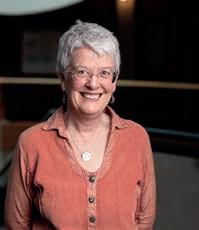

For me, university is mainly about people learning to recognize what it is that they don’t know—and then using this to question and learn as they go through life.
I would argue that, in part, critical thinking comes from critical inquiry—it comes from constantly trying to bring multiple pieces of information
together, asking questions to better understand, and then bringing what you have learned into the situation. As almost every situation is unique, you can’t rely on patterns. You can’t teach students to actually know everything. In nursing, medications change all the time, therapies change all the
time, the health care system changes all the time. If we educate nurses on merely memorizing and knowing and not on developing curiosity and understanding, then we’re producing nurses that are never going to give the best possible care. The world will have changed by the time they get into it.
We talk about relational inquiry underpinning our curriculum—about understanding there are relationships at numerous levels. Not just between you, as a nurse, and the patient, but with the health care system and patients’ other health care issues and the family in which they’re situated; always asking questions, always seeking more information and not thinking that you ever know everything.
These ideas about the purpose of the university are central to nursing. This is reinforced by studies, with
18 TRENT Magazine 49.2
THE
’11
hundreds of thousands of patients, that show that care by baccalaureateprepared nurses results in better outcomes for patients in terms of factors such as mortality and complications. I think what underpins this is the capacity that a university education builds for critical inquiry and thinking.
MOIRA HOWES

Dean of Arts & Science – Humanities
Humanities students gain a much deeper appreciation of the kinds of suffering that human beings experience and the reasons why we suffer. Importantly, they also develop expertise in both traditional and innovative ideas for reducing suffering and benefitting humanity. With the study of world literatures, history, and philosophy, students also gain a lot of insight into human character. It’s important to have a pretty solid understanding of character to live a flourishing life that benefits others.
At Trent, students have terrific opportunities to discuss course material directly with faculty and other students, at length, in their seminars. A very high degree of faculty engagement and peer engagement is possible at Trent. In terms of developing understanding, this is
enormously important. It is crucial that students get instant feedback on their ideas and exposure to different perspectives. When you’re reading history or philosophy on your own, you encounter your own perspectives, thoughts, and reflections—which is great—but it isn’t enough. We have to engage collaboratively with others to truly improve our thinking and feeling. A lot of empirical research now supports the idea that you need a diversity of discussants and researchers to produce really highquality research that can withstand critical tests and create genuinely novel solutions to longstanding problems.
Humanities students have wonderful opportunities at Trent to engage with others as they work to enhance their reasoning, communication, and research skills, and we are very proud of this fact. The study of the humanities gives students a set of tools that they can take into any occupation or discipline and use to further a more ethical and constructive engagement with others and the world. Seeing students cultivate these skills over the course of their degrees is so exciting and meaningful. I feel such gratitude that as a professor and dean I get to witness student transformations and transform myself in response to their thoughtful perspectives and new ideas.
CRAIG BRUNETTI

Dean of Graduate Studies
I believe that university education, including professional graduate programs, has become more accessible for students. Today, many students are looking for additional education after they finish their bachelor’s degree.
I think back to when I went to school, most students would not pursue graduate degrees—you would graduate with your undergrad degree and you’d be set for whatever type of career you were interested in. Students are realizing that grad degrees have value in many different types of careers.
In many fields, the entry to practice level has moved from an undergraduate to a master’s level. Oftentimes, in graduate school, you get very specialized skills. For example, you may do an undergraduate chemistry degree, which will have it’s own focus while remaining fairly broad, and then move on to the graduate level, where you narrow that focus down to a very small area that you have a lot of knowledge and skill in.
Certainly, we see more and more students getting graduate credentials to differentiate themselves from their colleagues or to better market themselves for a job.
In terms of the university ecosystem, having more graduate students present is a good thing, with the undergrads benefitting from the presence of grad students. The teaching assistants for undergrad courses are grad students. Many times, in fourth year, students will be
T RENT Magazine 49.2 19
All
Dean’s List photos: Micheal Hurcomb
doing thesis projects mentored by grad students. As well, undergrads looking for summer job opportunities will often have grad students that supervise them during their summer employment. These undergraduates see the grad students as potential role models as well. When they ask, wondering about next career or academic steps, they’ll often talk to the graduate students because they’re only a year or two removed from where the undergrads are.
So I think that the graduate students help enrich undergraduate life. They elevate the intellectual experience that undergraduate students receive when they come to university.
Graduate education builds on students’ undergraduate learning and teaches advanced skills in areas such as critical thinking, communication, problem-solving and leadership. Where an undergraduate degree provides a broad disciplinary experience, a graduate degree provides students with more advanced learning in a very specialized area.
CATHY BRUCE
Dean of School of Education & Professional Learning

We have a belief in the School of Education that the best teaching is learning. That, when we are teaching, we are learning; and when we’re learning, we are learning to teach.
Our teacher candidates are teaching and learning here at Trent —and teaching and learning in the classroom during their placements. It’s an immersive experience all the way through.
The goal is for them to take some of the theories and practices that they’ve been learning and try them out themselves—which they get
to do during placement. And it’s not always going to work.
But there’s something about the resilience and grit and persistence that’s needed in trying again and again to tweak things, and to continually revise and reframe and redesign as they go. Teachers do that at every level. You know a good teacher is going to take the time to really watch and listen to the students. Based on those observations, they’re going to make decisions about what they do next in their teaching. And that’s true for our teacher candidates as well as our faculty here.
Sometimes they will learn about a strategy or a way of thinking in classes at Trent and then apply it in the classroom—and it may not be successful immediately, but we encourage them to persist. It’s really important to really press on through the challenges and take the lead from the students.
timetabling nightmare to be able to use such diversity and breadth in your undergraduate education, but you can major in Chemistry and do a joint major with English Literature here. We have the capabilities of allowing students to explore academically as much as excites and entices them. This fosters a student that is well suited for today’s job market—a market that is looking for individuals who have learned how to learn, which you do in your undergraduate degree, but have also learned how to learn things that are outside of their one comfort area.
DAVID ELLIS
Acting Dean of Arts & Science –Science
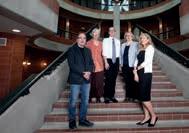
Trent University has always prided itself, and is well recognized in Ontario and in Canada, as being a university that creates an academic environment that allows students to have as much breadth as possible. It becomes a
Speaking from the experience of my own classes, having students that exhibit diversity enriches the class experience. Often questions from people that are outside of the subject discipline lead to intriguing new ways to perceive the material. As an instructor, these questions are often challenging and thought provoking. The students’ approach and their thoughts are, at times, unexpected, and it challenges you to be able to describe your subject in different ways, and to allow people to learn from different backgrounds. It is good for both the instructor and the students to see different rationalizations of subject matter.

20 TRENT Magazine 49.2

T RENT Magazine 49.2 21 ALUMNI BENEFITS & SERVICES The Official Trent University Alumni Association @Trent_Alumni trentu.ca/alumni alumni@trentu.ca Trent University Alumni Association page @TrentAlumni YOUR EDUCATION DOES NOT END WHEN YOU LEAVE TRENT UNIVERSITY As an alum, you can: Save money on insurance, athletics memberships and bookstore purchases Continue lifelong learning with free Bata Library membership, online journals, academic lectures and podcasts Advance your career through events, networking and professional development sessions Skill development through volunteer opportunities Free subscription to TRENT Magazine NEW Access over 1,500 perks with the new MemberPerks app
UNIVERSITIES: CLASS NOTES
WhenI began at Trent University, my objective was very straightforward: to get a career at the end of my degree. Nothing more specific than that. I simply wanted to ensure that I would have a job, any job in my field, and be able to financially support myself when I graduated. At the beginning of my education, I believed that was the purpose of university: to provide the skills needed to ensure employment.
What I got out of my time at Trent, however, was so much more than that.
When I began at Trent, I felt I had the applicable skills needed from a previous college diploma to find employment, but I also knew that I needed that piece of paper that said I had a degree to get anywhere in my field. I figured I’d just complete my degree and that would be that. What I didn’t anticipate was the number of things the Trent community would open my mind to—and not just the faculty, but the entire culture here. While I know I could have received a business degree anywhere, what made Trent so different was the inspiration I was able to draw from so many different people.
At some point in my education, I realized that the conversations in the classrooms, the values promoted by the University, the community I had built for myself, and the experiences that I had shared had slowly but definitively inspired bigger and more distinct goals for myself.
I now have a Bachelor of Business Administration degree from Trent in sustainability, ethical conduct, and human rights—and while none of those are formal streams in Business Admin, they are definitely attributes that were passed onto me during my time here. I now believe that each of these is also what the University stands for; and that this has seeped into every inch of the institution.
As a new graduate who secured a job two days after finishing exams, I can definitely say I was provided with the skills to begin my career. But what I am most proud of is that, with the help of what feels like an entire village, and institution, I now know what matters in the world to me and how I want to impact it.
To me, the purpose of Trent—and of all universities—is to open every student’s mind enough that they have the ability to define their own purpose within society. It is to ensure that students are thinking critically about the world and what they are going to do to better it.
ELLANNE THOMSON ’16
is a new graduate of Trent University with a B.B.A. degree and a Specialization in Marketing & Consumer Culture. She is currently a digital marketing assistant at Trent.

22 TRENT Magazine 49.2
Fresh from high school, young adults go to postsecondary for a variety of reasons: to appease family, to qualify for jobs, or simply because it feels like the default next chapter in life. Once arriving, many question what purpose this stress and financial adversity truly serves, while others appreciate the opportunity, or a combination of both.
Formal education has big-picture value in developing the critical thinking skills of a population, to help prevent political turmoil and oppression. Unfortunately, around the world, it is inaccessible to the poor, those among the most likely victims of a dictatorship. This begins as early as elementary school, where the quality of school is determined by the wealth of its neighbourhood, and it continues in university, which many poor people cannot access. On a global level, public education today is not fulfilling its purpose to its full potential.
On an individual scale, career development can be an important goal. Students leaving school with tremendous debt require the means to eradicate it. This influences choice in major. However, if students are going to leave school with an incredible amount of knowledge in a specialized discipline or two, they ought to enjoy the content. University is, indeed, primarily about learning. According to a 2010 study by Harvard and the Asian Development Bank, only 6.7% of the world has a college degree. It is an immense privilege to have so much knowledge; it would be a shame to loathe learning it.
I love both math and feminism. Instead of deciding between them I plan to complete a double major. This will help secure a living wage in a STEM field, allow me to engage in my passion for social justice, and open multiple doors for the future. While Math and Gender Studies is, of course, a unique combination, they are both topics I am interested in and there is nothing stopping me from getting the best of both worlds.
Oftentimes I sacrifice my grades for further education. I will choose to work on an assignment I know little about instead of handing in a math set on work I already fully understand. Ironically, learning more brings down my GPA. Part of me regrets these decisions and wants straight As, but overall I appreciate that I am getting more out of my programs.
University and residence can also help transition young students into adulthood. They have the opportunity to learn to manage their own finances, but without needing to cook their own meals or buy furniture, all the while in school, a familiar environment. They experience a new social world and, hopefully, begin to interact with others more maturely than in high school. These years of learning how to function independently are just as important as academic skills. While university is in no way necessary for this, it certainly helps.
Post-secondary education is important to our political system, to class issues, to enjoyment of life, and to molding new generations. Its purpose is to promote learning, which is utterly essential in all shapes and forms.
ELIZA RUBACHA O’HEARN
just completed first year in Math and Gender Studies. She hopes one day to teach high school or university math while continuing her feminist activism.

T RENT Magazine 49.2 23
Thanksto our generous donors, alumni and friends, Trent University has surpassed its ambitious $50 million goal—to help ensure Trent remains a small, intimate, unique university that is a transformative place of learning.
When we launched our most ambitious fundraising campaign, we made a promise to our students to provide an education that is personal, purposeful, and transformative.
Thanks to your support this exceptional fundraising effort helps further Trent’s top priorities: strengthening the transformative student experience by creating an interactive environment that develops thoughtful, articulate, active, globally aware and responsible citizens,


elevating teaching excellence, and providing students with world-class research experiences and facilities necessary to unleash their potential.
As the world around us undergoes profound change, we must ensure that a Trent education continues to prepare our students to be creative, think critically, understand diverse perspectives, and act with a strong moral compass. Philanthropy makes this possible. The $50 Million Campaign—Unleash the Potential helps our students make an impact on the world they will inherit.
$56.8M RAISED FINAL REPORT THE POTENTIAL UNLEASHED 24 TRENT Magazine 49.2 TRENT UNIVERSITY’S $50 MILLION CAMPAIGN UNLEASH THE POTENTIAL EXCEEDS GOAL
A TRANSFORMATIVE STUDENT EXPERIENCE
Trent University has always been committed to a transformative student experience delivered in a natural and built setting that inspires and elevates interactive learning. Thanks to your support through the $50 Million
Campaign–Unleash the Potential we have strengthened our interactive, intimate learning environment by investing in opportunities for students to explore, connect, and engage.
Highlights—your investments have unleashed a transformative student experience by:
• Fostering social and intellectual development with the new Student Centre and the revitalized Bata Library
• Reinvigorating college life through College Endowments

• Enabling access—1 in 8 students receives scholarships or bursaries
• Fostering excellence through sport with the revitalized Trent Community Sport & Recreation Centre and the Justin Chiu Stadium
• Investing in our architectural legacy and special spaces

• Deepening our Indigenous actions through the creation of Nozhem Theatre, a new wigwam and increased student support funds
TEACHING EXCELLENCE
Since its inception, Trent has attracted gifted faculty who explore the boundaries of learning through innovative teaching practices. With your help, we have invested in the practice of teaching, the central role of the library, and in new tools and technology that further strengthen Trent’s leadership in post-secondary education. We have unleashed teaching excellence by strengthening our renowned student focus and providing new tools to engage in intellectual discovery.
Highlights—your investments have strengthened teaching by:
• Creating the first endowed chair: Kenneth Mark Drain Chair in Ethics
• Bridging research and practice through The Distinguished Visiting Teaching Scholar Endowment and teaching fellows
• Inspiring students with lectures by world-class thought leaders and visiting scholars
“I am tremendously impressed by the generosity of our donors. Your support has helped us exceed our goal by more than $6.8 million. While the world around us changes, your commitment to Trent remains steadfast. Together, our students and donors have made this campaign the most successful Trent campaign of all time.
I am deeply grateful to all who have contributed, and in doing so helped shape the future of Trent.”

LEO GROARKE, Ph.D., President and Vice-chancellor, Trent University

T RENT Magazine 49.2 25
“Trent is an institution profoundly anchored in philanthropy. Since our inception more than 50 years ago, those who believe in the power of education to transform lives and build community have given their time, talent and resources to ensure Trent remains a special place of learning. We are immensely grateful to the thousands of donors and volunteers who have made this campaign a success. Thanks to you, Trent is a vibrant institution making a real difference in the world. This is just the beginning; I look forward to what we can accomplish together in the future. The possibilities are infinite.”
WORLD CLASS RESEARCH
Trent has a well-deserved reputation as an institution that makes the world a better place. This is evidenced in our focus on environmental sustainability, Indigenous studies, social justice, community development, aging, and access to education. In a world facing pressing environmental, social and economic challenges, our faculty and students have always recognized that complex issues require multifaceted solutions drawing upon diverse disciplines and perspectives.
Leading-edge research, facilities and equipment were unleashed by offering new tools, experiential learning, research and knowledge mobilization that keep Trent at the forefront of solutions to challenging

and urgent local, national, and global problems.
Highlights—you have helped support world class research by:
• Investing in Biomaterials Innovation
• Addressing the planet’s most pressing environmental issues through water quality research, sustainable agriculture, wildlife and aquatic research
• Establishing international partnerships with the International Institute for Environmental Studies
• Funding graduate research internships
• Creating the first endowed professorship: The David Schindler Professorship in Aquatic Science

“It’s hard to do amazing things like travel and study abroad when you’re a student. Your contribution to my academic career has allowed me to achieve my dream.”
CHARLI LAWSON-LEE, 2016-2017 Rita Chiu Study Abroad Bursary recipient
JULIE DAVIS, Vice-president, External Relations & Advancement, Trent University
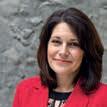


“I am hoping to pursue further education in the field of medicine, virology, and microbiology. These fields will give me the ability to make a difference in human health by finding novel solutions to illnesses. The Colin Taylor Award has helped reduce financial stress and allowed me to focus my attention on learning and exploring the world of research.”
SABATEESHAN MATHAVARAJAH, 2016-2017 Colin Taylor Award recipient
26 TRENT Magazine 49.2
Continued
is
STOHN

of






THANK YOU We are just getting started... TOTAL $56,851,902 * Includes staff, faculty, retirees, or Board members who are alumni “It
an honour to be able to contribute to an institution that reflects the elements of the Trent experience that have meant so much to my life, and could mean so much to the lives of Trent students in the future.” STEPHEN
’66, President
Epitome Productions and a Canadian entertainment lawyer 690 New donor-initiated funds were created, and 399 of these funds are for student assistance OVER10,000 Students received donor support 8,461 Donors gave 57,749 gifts to the campaign 270 Legacy Expectancies T RENT Magazine 49.2 27
BUILDING COMMUNITIES & DRIVING DISCOVERY
Universities have often developed as isolated campuses detached from the local community. In the past few decades, however, there has been a growing movement across Canada and internationally where academic institutions are taking an active approach to creating shared spaces that blur the line between campus and community.
Sheldon Levy, past-president of Ryerson University in downtown Toronto, stated in a 2011 TEDx Talk, “As we are building the university, we are building the city.” Ryerson has offices and a community-integrated innovation centre built above a Cineplex Odeon multiplex, where morning classes are often held in theatres. Former Trent president John Stubbs moved to Simon Fraser University where he declared the intention to build a “model sustainable community.” Today, UniverCity is a 5,000-resident community that has
INTELLIGENT
Mark Betteridge: I have learned that studying and doing aren’t the same. Critical observation, deduction, inference and projection can lead to experimentation; and that may be the end game, validly. But subsequent application to services, products and processes that improve the human condition requires a different mindset.
I had the privilege of running Discovery Parks in Vancouver for more than 20 years and we built almost 2 million square feet of technologically green-savvy buildings on and off campuses. Located in the centre and on the periphery of campuses (the five-minute walk from academia to R/D is ideal), several hundred firms moved through our spaces, some to commercial viability. These start-
received more than 30 awards for best practices in planning and sustainability. For SFU, this development creates a vibrant community connection for the isolated campus, has bolstered their reputation for sustainability, but also generated a source of revenue to invest in teaching and research. Across Canada, universities are also using their land to create new places for research discovery and commercialization. With the creation of the Cleantech Commons at Trent, there are now 27 university research parks providing vital employment for advanced degree holders, experiential learning for students, and innovation-led community economic development.
University of British Columbia was the first in Canada to embark in a major way on strategic land development. Mark Betteridge ’70 was the first president of what is now the UBC Properties Trust, and then became manager of Discovery Parks,


a series of high tech and life science innovation centres at UBC, SFU and BCIT. We reached out to Mr. Betteridge regarding his experience and the role of Universities in developing communities and building centres of innovation.
up firms created thousands of jobs and advanced ideas that often came from the host university’s academic research (intellectual property). A high proportion of these enterprises were driven by founders wanting to solve world-scale problems in environmental, health and social fields. I have personally invested in 17 such
firms, such as G-Pak, Just Bio Fiber and Terramera Bio Sciences, so have my money where my mouth is.
I have learned that it makes far more sense to bet on the person, not just the technology. I can measure success directly by truly assessing the people I have invested in for almost 20 years and then correlating this with the outcomes. Brilliant technology can languish if it is not owned and advanced by people determined to succeed. While basic then applied science are the fundamental starting points, it’s the social interaction between these innovators that brings positive outcomes. And where does this interaction take place?
Well planned, located, constructed and managed buildings house these
28 TRENT Magazine 49.2
GROWTH: EXPANDING CAMPUSES
driven entrepreneurs. Some of the university-based research parks have been acknowledged as world leading innovators in land use and the application of green technologies. Google the Association of University Research Parks and the International Association of Science Parks for examples. And as much as we plan to the best of our abilities, the creativity often happens around the edges of these buildings. Remember, this is a social sport. Serendipitous conversations in hallways, coffee shops, lounges, bicycle rooms and more have been known to create
unexpected partnerships and collaborations. By definition, most of the occupants are striving to build enterprises to solve world problems, make some money and feel they have contributed to their own definitions of community; so they have that much in common to start. They are accepting and tolerant of degrees of risk. I have always been pleasantly surprised by how collaborative these people are.
The core university benefits heavily. Licensing of intellectual property means that academic research is advancing in the hands of risk-taking entrepreneurs with no financial risk
to the university. Students and faculty create jobs for themselves and others. Products, services and processes can win national and international acclaim for the principals and for the university, thus enhancing reputation.
I attended Trent way back in the 1970s and I have benefitted from that education ever since. I am grateful for this chance to encourage a carefully planned and environmentally sensitive research and development community that complements and supports the core academic mission of Trent University.
One of Trent University’s most significant assets is its 1,400+ acres of land holdings consisting of the Core Campus, the Endowment Lands, and the Nature Areas. Currently there are several new developments on campus underway, including the Cleantech Commons, a City of Peterborough arena complex, and sports fields.
Since the original 1964 Master Plan for Trent there has been a vision to carefully and thoughtfully develop portions of the Endowment Lands to support the Trent and Peterborough communities. Other universities have been able to successfully use their lands to enhance the student experience, foster new research and academic partnerships,
create experiential learning and employment opportunities, provide services to local neighbourhoods, and generate additional revenue streams for strategic projects. The Trent Lands Plan aspires to achieve these goals all while maintaining 60% of its lands as Nature Areas, buffers and wildlife corridors—to ensure sensitive development and minimize environmental impact.
The Trent Lands Plan (2013) and the Endowment Lands Master Plan (2006) guide the development of the Endowment Lands so that the Trent community and Peterborough region may enjoy all these benefits. The plans are intended to outline potential uses for the lands and priority staging. As
Above: Artist rendering of the new Noblegen building in the Cleantech Commons.
each project enters an exploratory or feasibility stage, appropriate assessments (e.g., geotechnical, environmental, archaeological, financial) will be undertaken, public consultations will be held, and Board of Governors approval required.
The 2017 approval of the Master Plan for Cleantech Commons will enable the designated research park site to become Canada’s premier green technology research and innovation site, hosting a cluster of companies and start-up enterprises in environmentally-focused fields.
Check out the latest campus developments and Lands Plan updates at trentu.ca/trentlandsplan


T RENT Magazine 49.2 29
TRENT LANDS PLAN: DEVELOPMENT ON TRENT’S SYMONS CAMPUS
Freedom of Speech at Universities: The Difficult Path to Critical Inquiry

Ilike
March Open House at Trent University. Prospective students and parents pour in and out of the buildings, asking directions, snapping photos. They also get a taste of university life at our “mini-lectures,” intense 20-minute slices of teaching by faculty in different disciplines.
I offered the mini-lecture for Philosophy this year. Families crowded into my classroom. Students sat toward the front while the parents edged to the coffee in the back. I started up a PowerPoint presentation and bombarded the room, in the first five minutes, with ethical questions about startlingly specific matters of sex and death, crime and punishment. I smiled at the eager looks on the student faces and the stunned looks on the parents’ faces, and said, “Whoever told you that universities are too politically correct and have no free speech any more probably isn’t someone currently enrolled in a Philosophy class.”
The laughter in response was a relief. Excellent, I thought, “they’re on board.”
What were they getting on board with? Free speech, I’d say, at least in part. But it wasn’t the unfettered freedom to say every possible thing I could think. If I had started out by insulting or threatening their kids, the parents would have been rightly outraged. If I had started out by releasing the confidential data
of my current students or urging harm to whole groups of people, they could have complained about my illegal conduct. Free speech has never meant the unfettered liberty to express every thought, regardless of the content.
But free speech at a university does mean that I am explicitly provided the academic freedom to teach and to discuss issues in the way that I believe will further the purposes of teaching, research, and inquiry, even when I am deliberately provocative.
And I do provoke deliberately. My classes are on topics including propaganda, sex, political revolution. The slogan that Trent aims to “challenge the way you think” is not just public relations. It’s the mission.
Consider our provincially mandated degree-level expectations, listing what students should be able to do by the time they leave: develop and analyze arguments, identify the limits of their knowledge. How can students whose assumptions are never unsettled do these things?
To analyze an argument, a student needs to know what the reasons are for the conclusion. To understand those reasons, a student needs to take them seriously—especially when they disagree with the reasons.
Disturbing their thoughts is one way that I aim to move students to reflect on their reasons for holding their own beliefs, and ask more of me as to why views they disagree with are held by others. The mission is not to change their minds, but to get them better at using them. The mission is not just thinking—it’s critical thinking.
Having said that, though, I really was relieved when the parents at Open House laughed and relaxed. Free speech in the service of critical thinking is a necessity at university, but it’s not always pleasant. It’s a mechanism permitting effective teaching and research, but a
30 TRENT Magazine 49.2
Professor Kathryn Norlock
Samantha Moss
mechanism isn’t a guarantor of good use. In truth, some of the hardest conversations I have had with students at Trent University have been around issues of the free speech of professors and guest speakers.
A few years ago, a guest came to the Philosophy Department and argued, unexpectedly, that only heterosexuality is morally permissible. Students argued against him politely, for which I was grateful. Several also came to my office with questions: Why would you allow this speaker to come? How could you provide a platform to someone dedicated to telling me that I’m a bad person?
At such times, free speech is not a pleasure. I don’t even think it’s good. But the value of free speech is not in its goodness.
CREATING SPACE FOR DISCOURSE
One of the issues of today is the extent to which universities should operate as political organizations. To some extent, universities are political organizations, but not in a sense that implies that they should be engaged in detailed analysis—or offer detailed opinions—about the political issues that confront us every week.
To the extent that political commentary belongs at university, it’s the job of students and professors. As institutions, it is more important for universities to create an atmosphere in which there is freedom of expression and civil debate between people who may have (radically) opposing points of view.
election. The University does not favour one election candidate over another. As a public institution it will respect the decisions of the electorate and work with whatever politicians are elected. At the same time, we will provide a welcoming space where individuals can argue the merits of the complex issues that fuel electoral debate.
Personally, I agree with John Stuart Mill’s views in On Liberty, where he argues that freedom of expression is a core value that is essential to the good society. Because it is the “clash” of different opinions that ultimately makes us understand things better.
I struggled, right along with my students, to sort out exactly what our guest speaker said, and why, what his purposes were, and whether they were the purposes appropriate to inquiry or illegitimate, like the recommendation of harm to a group. That’s the job.
Continued on the following page.
It goes without saying that political parties and advocacy groups are important political organizations. They have key roles to play in a democracy. A university is something else. It’s a provider of education that will serve us all best by opening up space for discussion and debate. At times it is challenging to balance the university’s commitment to freedom of expression and other values. A topical example that illustrates Trent’s approach is the
That clash—the disagreement, the debate that occurs when people have different points of view—is an essential part of education. It’s also an essential part of research. The university must create space for that. Very occasionally, it may also want to comment on extraordinarily important issues. But it will lose its way if it is too engaged in the very detailed political issues and debates that arise in the politics of the day.
– Dr. Leo Groarke
T RENT Magazine 49.2 31 Shutterstock.com © rob zs
That’s what a university is for. None of us were happy, but all of us were thinking, carefully and critically. The speaker did not recommend harm, but still, we felt pain. Pain is a good natural alarm system. It’s an indicator that someone is wrong. But it’s not an indicator that the mechanism allowing it is inappropriate to the mission.
At such times, free speech is not a pleasure. I don’t even think it’s good. But the value of free speech is not in its goodness.
The value of free speech is its availability to all of us doing something of basic importance to civil society: teaching, learning, understanding someone’s reasons for holding a view that we don’t share.
If we don’t try to do these things, we’re barely coexisting. We’re a society of individuals who cannot bear to think about each other’s views.
There are days it’s not worth trying, those individual moments when you’ll read about someone driving a van into a crowd of people, and the misogynist beliefs he apparently wrote online before doing so can be met with an easy rejection. There’s someone who urged harm to a whole group, in no uncertain terms, and you’ll rightly think that such views are not worth a platform.
At universities, though, where we routinely talk about groups, there are days it’s less obvious what the recommendation is. Online
provocateurs circulated a slogan last year, “it’s okay to be white,” with the expressed intention to be divisive; a guest at Trent University offered a talk that deliberately played on the slogan, with the title, “It’s okay to be (against) white(ness).” Not worth a platform, some assume. But it’s not that easy. Again, the job of a university is to work out the truth: what was said, and why, whether a speaker recommended harm, and when he didn’t, working out his purpose. Our responses can be critical, in every sense of the word: important, evaluative, even negative. It can hurt. But working it out is still the mission. Our free speech fosters the painful possibilities for inquiry.


32 TRENT Magazine 49.2
Samantha
Moss
Professor Kathryn Norlock is an associate professor of philosophy at Trent, and affiliated faculty in Gender and Women’s Studies, as well as a faculty member of the M.A. program in Sustainability Studies. She is the Kenneth Mark Drain Chair in Ethics at Trent University.
GIVING BACK: Gordon Knapp of Bridgestone Americas Inc.
Gordon Knapp ’79 believes in the importance of community. Now the chief executive officer and president of Bridgestone Americas, Inc., he grew up between the closeknit towns of Brighton and Colborne, Ontario, immediately became part of a tight brotherhood of friends at Champlain College, and now sees the company he works for as an essential part of the city that houses it.
It’s no wonder that he finds volunteering with the Nashville United Way so important. The son of an apple farmer and a high school teacher, Mr. Knapp was part of a family that was deeply immersed in the community where he grew up. And when it came time to attend university, he says he was fortunate to find himself attending Trent and gaining such important friends.
“Because my mother was an alumna from Queen’s, she kind of pushed Queen’s,” he recalls. “But some of my high school teachers encouraged me to look at Trent. Trent was still fairly young at that time, but had a growing reputation as a strong university that was coming into its own. To be honest, I was lucky. I got a small scholarship from the school, but I also just liked the grounds. I liked the feel of it. Like a lot of teenagers when they make that decision, the feel had an impact. As well, it was relatively close to home, but still far enough away. It was just a nice balance. I feel fortunate about that choice.”
Arriving at Trent, he immediately formed a tight network of like-minded individuals.
“I was in Champlain College at the time, so I was in an all-male residence with five other guys on my floor. Four of us remained really good friends, and lived in the dorms for all four years. We were comfortable with each other and with living together. And it worked. So I never moved off campus.”
Mr. Knapp also spent all four years playing on the soccer team—which he considered his “second” Trent family. Then, there was the academic community.
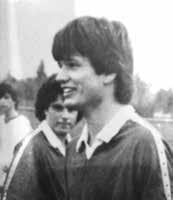
“I remember the degree to which the professors cared,” he notes. “It still sticks out in my mind. I developed close relationships with the master of the college, [Professor] Freddy Hagar. He had a tremendous influence over me. He also had a calming influence over the guys in that building. And we clearly needed it. Then there was [Professor] Harry Kitchen. I had a number of his courses, and got to know him very well. He’s clearly an individual that had a huge influence over me. Professor Bill Hunter was another who had tremendous impact. You remember the folks that took a personal interest, that you could talk to, and could get advice and feedback from. These are individuals that I remember, to this day, as being integral during my academic career at Trent.”
Even after he departed Trent, it was community connections that helped him in his career.
“As with Trent, I’ve had business leaders that took a personal interest and provided me with lot of guidance and mentoring.”
After his undergrad at Trent, Mr. Knapp went immediately on to Western, where he completed a two-year M.B.A. He gained a job with Warner-Lambert (an American pharmaceutical company), working with them as they were acquired by Pfizer Inc. in 2001. He eventually moved up to vice-president and president of North America Consumer Brands at Pfizer, and then became president of the Kimberly-Clark Corporation, Family Care North Atlantic, Consumer Tissue Division.
He joined Bridgestone in 2013 as president, Consumer Tire, Bridgestone Americas Tire Operations North America.
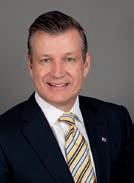
Because of his success—or, perhaps, despite it—community remains a priority for him.
“When you hold a position like CEO, you have a responsibility for a lot of people,” Mr. Knapp explains. “It’s a responsibility I take very seriously. It’s not just the people who work for you, it’s their families that depend on them as well. We’re the second-largest corporate employer within the greater Nashville area. Because of our size, we have a major influence on Nashville— but Nashville has a major influence on us. I tell our teammates this all the time. I honestly do believe that it’s very much a symbiotic relationship. Nashville will probably never be any stronger than us, and we’ll never be any stronger than Nashville.”
As chair of United Way Nashville, Mr. Knapp believes in using his collaborative and leadership skill set to help the community.
“One of the ways that you can drive engagement, drive unity, drive collaboration, is by getting people inspired about working and giving back to the community. It’s amazing the amount of energy that can be produced. People generally feel good about the fact that they can have such a positive impact in the community that houses them.”
It’s been a long road from Colborne to Nashville—from the apple farm to the boardroom—but one that Mr. Knapp never once travelled alone. His aim is to make sure that others get the same advantage. And that, really, is what community is all about.
T RENT Magazine 49.2 33
Withover 110 participants in 23 cities across Canada, and 4 countries around the world, the first annual Trent University Alumni Day of Service was a resounding success. It was held on May 5th in Peterborough and Oshawa, on May 3rd in Vancouver, and throughout the first week of May in other cities. Created with a goal of bringing together Trent alumni and community members across the globe to volunteer with organizations in their area, Day of Service acted as a catalyst for introducing alumni, students, faculty and staff to local non-profit organizations, and for promoting and recognizing ongoing volunteerism.
“Trent University encourages students to make a difference in the world, and the Day of Service allows us to take time to recognize how alumni are doing this through volunteerism in their own communities,” said Alumni Affairs Director Lee Hays. “Save the date for next year, May 4, 2019.”


In Peterborough, volunteers worked alongside staff at Kawartha Foodshare, helping to package food for distribution to meal programs, food banks, housing projects, and food cupboards across the City and County of Peterborough.

34 TRENT Magazine 49.2
First Ever Trent University Alumni Day of Service Gives Back to Cities Around the World THE SUCCESSFUL EVENT BROUGHT TOGETHER ALUMNI, FACULTY, STAFF & STUDENTS AND FOSTERED VOLUNTEERISM JOIN US MAY 4 2019
In Oshawa, members of the Trent University Durham GTA community worked with Feed the Need Durham, by painting their office and warehouse and helping to package food for distribution to food banks, shelters, and soup kitchens throughout Durham Region.


Outside of the two campus communities, more than 30 individuals took part, volunteering in their own towns and cities. The Vancouver alumni chapter, held their Day of Service on May 3rd at Ronald McDonald House BC, serving a BBQ dinner to the families in residence.

Trent University Alumni Association President Jess Grover ’02, was thrilled by the participation of her fellow Trent community members.“I’m overjoyed with the outpouring of Trent spirit we saw for this inaugural day,” she said. “Trent was founded with a dedication to community in mind, and we saw that dedication come alive in the alumni family today. I know in my heart that Trent alumni are especially engaged and passionate, and today reminded me how true that is. I especially want to thank our sponsor TD Insurance Meloche Monnex who share our community values, and our community partners who welcomed us into their organizations with open arms.”

T RENT Magazine 49.2 35
Proudly sponsored by
In a great show of solidarity with the Day of Service, Bruce Weaver, relationship manager for TD Insurance Meloche Monnex, participated at Kawartha Food Share.
Durham Vancouver
Peterborough
2018 CONVOCATION AWARD WINNERS
HONORARY DEGREE RECIPIENTS
A corporate mental health advocate; orator, author, and first-hand witness to the Holocaust; executive director of the Ontario Federation of Indigenous Friendship Centres; and an innovative architect known for his work at Trent and around the world—meet Trent University’s 2018 honorary degree recipients.
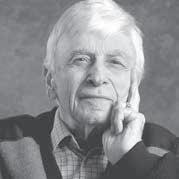
GEORGE COPE
Known as a strategic communications industry executive and a builder of highperformance teams, George Cope leads Canada’s largest communications company as president and chief executive officer (CEO) of BCE Inc. and Bell Canada. In addition to being respected for his long-standing success in the business world, he has become well-known for spearheading the launch of the Bell Let’s Talk initiative, the largest-ever corporate commitment to Canadian mental health.

SYLVIA SKONAGANLEH:RA MARACLE
Sylvia Maracle is known for her advocacy for Indigenous peoples, particularly for Indigenous urban youth. As a Mohawk from the Tyendinaga Mohawk Territory and a member of the Wolf Clan, Ms. Maracle is dedicated to creating healthy communities and improving the lives of urban Indigenous people in Ontario and across Canada. She is the executive director of the Ontario Federation of Indigenous Friendship Centres, the largest urban Indigenous service network in the province providing culturally appropriate services.

STEPHEN TEEPLE
A highly-respected Canadian architect of innovative private and public-sector buildings ranging from museums and civic buildings to downtown condos, Stephen Teeple is principal of Teeple Architects, a Toronto-based company which he founded in 1989. On display around the world and across Canada, his artistic works are conscious of environmental and cultural sustainability while paying close attention to the spatial experience.
MAX (TIBOR) EISEN
Max Eisen is a Holocaust survivor. Born in Czechoslovakia in 1929, Mr. Eisen is the only member of his large orthodox Jewish family to survive the Holocaust. Mr. Eisen survived slave labour in Auschwitz, Mauthausen, Melk and Ebensee Camps and was forced to go on a death march in January of 1945 where thousands died from exposure to severe weather conditions and malnutrition. After his arrival in Toronto in 1949, he studied English and worked at variety of jobs before launching his own manufacturing company in 1964. Considered a respected pioneer in his industry, Mr. Eisen retired in 1992.
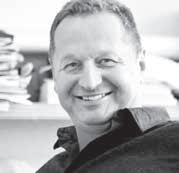
36 TRENT Magazine 49.2
Read student profiles, full honorary degree recipient profiles, and more at trentu.convocation or follow along for updates on the upcoming ceremonies

HONOURING THE TRENT COMMUNITY
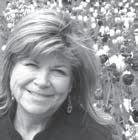

Along with celebrating our graduates, every year at convocation, we recognize remarkable Trent faculty and staff members who have made an impact in the classroom, in the Trent community, and nationally, and internationally for their research expertise.
SYMONS AWARD FOR EXCELLENCE IN TEACHING
Dr. Kelly Egan, an assistant professor in Cultural Studies, is honoured with the 2018 Symons Award for Excellence in Teaching. Dr. Egan was recognized for being an extraordinary professor, for being extremely knowledgeable in her field, and for being an influencer inside and outside of the classroom. Her commitment to student learning ensures that students have the support and encouragement needed to thrive.
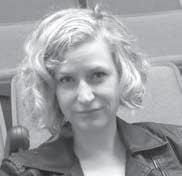
DISTINGUISHED RESEARCH AWARD
As recipient of the 2018 Distinguished Research Award, Dr. Stephen Bocking, of the Trent School of the Environment, is recognized for pioneering and internationally-recognized research that has impacted the fields of environment history, the study of Canada’s North, the history of science and environmental politics.
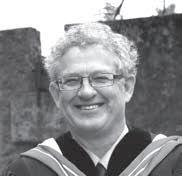
EMINENT SERVICE AWARD WINNERS
Three outstanding individuals have been awarded the 2018 Eminent Service Award in recognition of notable contributions to life at Trent during their time at the University: Bryan Davies, former chair and long-time member of the Board of Governors and continued volunteer and advocate for Trent; Sue Graham Parker ’73, Trent alumna and current Board of Governors member; and Gillian Stamp, retired assistant director of athletics, varsity coach, and longtime volunteer with Trent University.
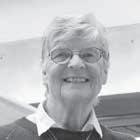
For more information on convocation, event coverage, and live streams of ceremonies, please see trentu.ca/convocation

at #TrentUConvo
T RENT Magazine 49.2 37
ALUMNI HOMECOMING & HEAD OF THE TRENT REGATTA
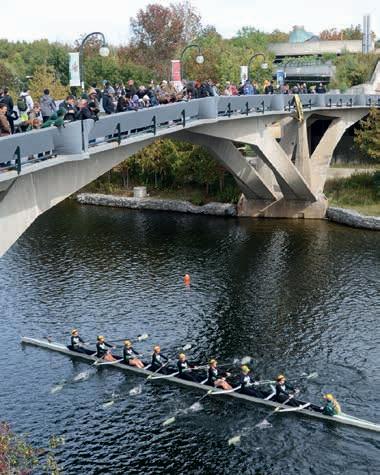
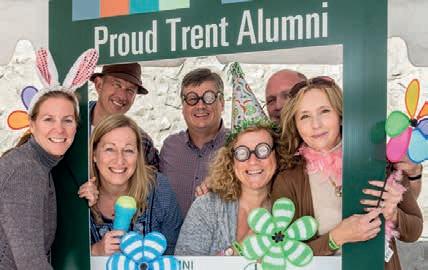
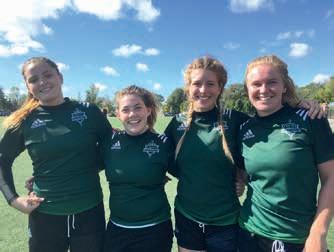
FRIDAY, SEPTEMBER 28 – SUNDAY, SEPTEMBER 30

Homecoming is a great time to return to Peterborough. Connect with friends, participate in special reunions, tour campus, get free alumni swag, pick up Trent gear, enjoy the alumni party in the Ceilie, check out the bands in the beer garden, watch the rowing, take in varsity games in the Justin Chiu Stadium, and much, much more!
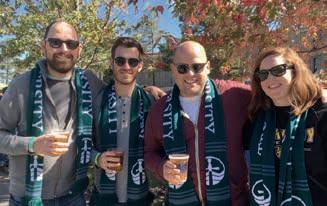
38 TRENT Magazine 49.2
2018
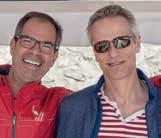

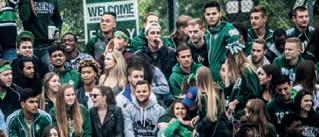
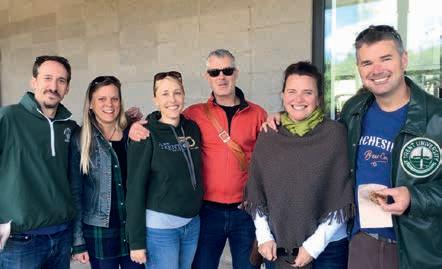
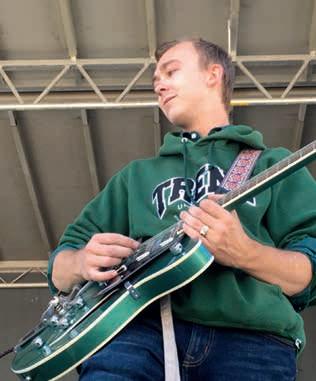

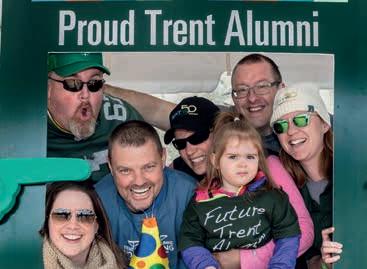


T RENT Magazine 49.2 39 Special Homecoming anniversary celebrations taking place this year include: 50 Years of Geography at Trent, the Lady Eaton College 50th Anniversary, the 40th Anniversary of Nantes Study Abroad, and the grand re-opening of the newly renovated Bata Library. Full details for all Homecoming events and special Homecoming anniversary events will be posted at mycommunity.trentu.ca/homecoming-schedule Welcome back alumni, family, and friends
CLEANTECH COMMONS AT TRENT UNIVERSITY

Canada’s Premiere Cleantech Destination
how Trent is making a global impact by building a sustainable future through top-notch environmental research, experiential learning for students and a bright economic picture for our entire community.

trentu.ca/cleantechcommons
Discover
CHALLENGE THE WAY YOU THINK ABOUT OPPORTUNITY
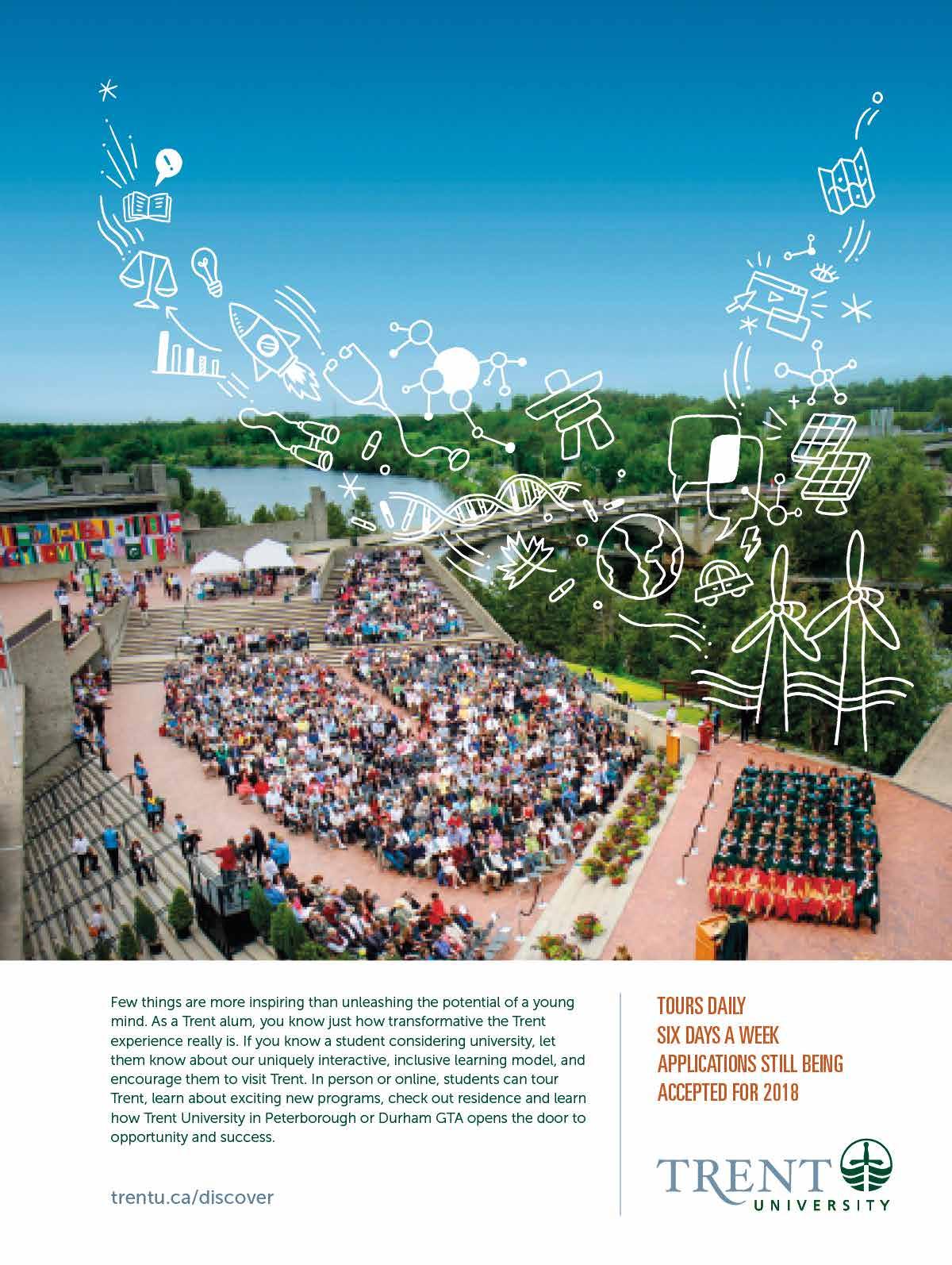
LOOKING BACK
Despite the Mad Men old-school cool shown in this 1967 photo, founding Trent University Board of Governors chair, Dr. Charles Fraser (left), was known for his tenacity and determination. According to the founding University president and vice-chancellor, Professor THB Symons (right), it took Fraser’s “vigorous and undaunted leadership” for the ambitions of the Peterborough community to culminate in the creation of a university. Known for his steely glare, Dr. Fraser nonetheless wears an expression of amusement during his Board retirement party. For a firsthand personal recollection of “Chuck” Fraser’s work and life, please see a TRENT Magazine Live exclusive by Professor Tom Phillips at trentmagazine.ca/fraser
It has recently been announced that all former chairs of the Trent Board of Governors will be inducted into a newly created Fraser Society. This very special group of volunteers have provided exceptional leadership for the University, involving a significant amount of time attending meetings, representing Trent at events, and being ambassadors for the University.
 Parks Peterborough Portrait Studio, courtesy of the Trent University Archives.
Parks Peterborough Portrait Studio, courtesy of the Trent University Archives.







































































































 Parks Peterborough Portrait Studio, courtesy of the Trent University Archives.
Parks Peterborough Portrait Studio, courtesy of the Trent University Archives.
